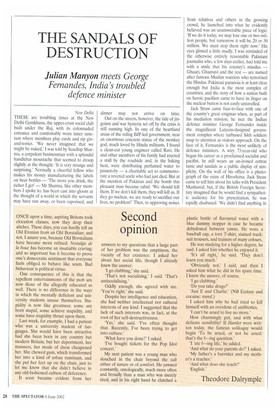Second opinion
ONCE upon a time, aspiring Britons took elocution classes; now they drop their aitches. These days, you can hardly tell an Old Etonian from an Old Borstalian; and not, I assure you, because Old Borstalians have become more refined. Nostalgie de la boue has become an insatiable craving; and so important has it become to prove one's democratic sentiment that everyone feels obliged to behave like scum. Bad behaviour is political virtue.
One consequence of this is that the repellent entertainments of the mob are now those of the allegedly educated as well. There is no difference in the ways in which the mentally deficient and university students amuse themselves. Stupidity is now like greatness: some are born stupid, some achieve stupidity, and some have stupidity thrust upon them.
Last week, for example, I had a patient who was a university student of languages. She would have been attractive had she been born in any country but modern Britain, but her deportment, her manners, her mode of dress cheapened her. She chewed gum, which transformed her into a kind of urban ruminant, and she put her feet up on the chair, just to let me know that she didn't believe in any old-fashioned culture of deference.
It soon became evident from her answers to my questions that a large part of her problem was the emptiness, the vacuity of her existence. I asked her about her social life, though I already knew the answer.
'I go clubbing,' she said.
'That's not socialising,' I said. 'That's antisocialising.'
Oddly enough, she agreed with me. 'You're right,' she said.
Despite her intelligence and education, she had neither intellectual nor cultural interests of any kind. I suggested that the lack of such interests was, in fact, at the root of her self-destructiveness.
'Yes,' she said. 'I've often thought that. Recently, I've been trying to get into culture.'
'What have you done?' I asked.
'I've bought tickets for the Pop Idol concert.'
My next patient was a young man who slouched in the chair beyond the call either of nature or of comfort. He yawned constantly, ontologically, much more often and broadly than a man who was merely tired, and in his right hand he clutched a plastic bottle of flavoured water with a blue dummy stopper in case he became dehydrated between yawns. He wore a baseball cap, a torn T-shirt, stained tracksuit trousers, and trainers of many colours.
He was studying for a higher degree, he said. I asked him whether he enjoyed it.
'It's all right,' he said. 'They don't learn you much.'
'Obviously not,' I said, and then I asked him what he did in his spare time. I knew the answer, of course.
'I go clubbing.'
'Do you take drugs?'
'Just E and Charlie.' (NB Ecstasy and cocaine: transl.)
I asked him why he had tried to kill himself with an overdose of antibiotics.
'I can't be arsed to live no more.'
How charmingly put, and with what delicate sensibility! If Hamlet were written today, the famous soliloquy would begin `To be arsed, or not be arsed: that's the f—ing question.'
'I 'ate f—ing life,' he added.
'And what do your parents do?' I asked. 'My father's a barrister and my mother's a teacher.'
'And what does she teach?'
'English.'
Theodore Dalrymple






















































































 Previous page
Previous page